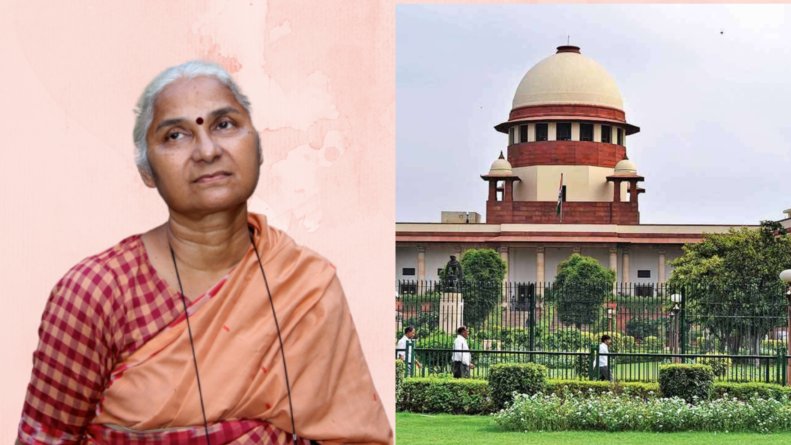[COVID-19] Social Activist Medha Patkar Knocks Apex Court Seeking Uniform Mechanism to Decongest the Prisons on Pan India Level, Urges Court to Release Prisoners Above 70 Years of Age
(Judicial Quest News Network)
Social activist Medha Patkar has approached the Supreme Court, expressing concern that Apex Court’s intervention to release the prisoners above 70 years of age has not helped elderly inmates, specially those who are above 70 years of age.
The activist seeks the Apex Court to direct the State Governments/ Union Territories/High Powered Committee (HPC) to formulate a uniform mechanism so as to decongest the prisons pan India, with respect to the release of prisoners aged above the age of 70. The Petitioner, is a social activist who has dedicated her entire life for the welfare and well-being of the poorest of the poor. She is the National Convenor of National Alliance of People’s Movements, which is an alliance of progressive people’s organizations and movements in India and the nodal person for integrating various civil society organization and individuals working against injustice and other discrimination. She has been instrumental in moving the masses against several social issues including atrocities against the deprived class, casteism, communalism.
The plea relies on report by World Health Organization (WHO).
The report Saya that the majority i.e., 64% of Covid-19 cases were between the age of 25 to 64 years. The WHO declared that COVID-19 causes higher mortality among older persons, particularly in persons with underlying medical conditions, such as cardiovascular disease, chronic respiratory disease, diabetes, and cancer. Further, the Imperial College, London COVID-19 Response Team has reported that symptomatic individuals in their seventies are twenty times more likely to require hospitalization than those in their twenties.
The plea filed through Advocate Vipin Nair. The petition drawn by Advocate SB Talekar stated that the most of the categorization of prisoners are based on social conditions and on factors of administrative concerns. The petitioner further contends that this Hon’ble Court while issuing the directions emphasized that the need of decongestion was a matter concerning health and right to life of both the prison inmates and the police personnel working. This Hon’ble Court directed every State including those who had not constituted the HPCs during the first wave, to act upon the directions issued by it.
The High-Powered Committees constituted by various states pursuant to Supreme Court order to release prisoners on parole due to COVID-19 have not taken into account the categorization prisoners on the basis of their susceptibility to the infection and their need to be released on an urgent basis.
The petitioner maintains that the most susceptible prisoners, who have higher chance of getting infected, specifically septuagenarian prisoners above 70 years.
The pleas further look at the various approaches adopted by different HPCs for the release of aged prisoners, and has also presented a record of the statics obtained from the National Prison Information Portal regarding the number of aged prisoners in Central Prisons across Rajasthan.
The petitioner further submits that barring a few exceptions, many states have taken no steps regarding the release of aged prisoners.HPCs of Rajasthanand Gujarat have directed the release pursuant to the directions ogf the High Courts.
It can be thus seen from the different approaches of the HPC’s that
there is no uniformity in this regard by the HPC’s of different State
and also, there seems to be no uniform criteria adopted by the States to
decongest the prisons where aged/elderly prisons are undergoing them
sentence of imprisonment.
The plea also submits that the chances of law-and-order situation on account of release of elderly prisoners are less, as the tendency to indulge in repeated offences reduce at such an age. The international studies in Recidivism of prisoners released in 1994: A special report even reveals the fact that as age increases, recidivism rates decrease, which means that older prisoners are most likely to desist from criminal activity and benefit from rehabilitation services as evidenced by their low rates of recidivism.
The petition avers that unless the aged prisoners are given special treatment and are considered for being released either on interim bail or emergency/special parole, the possibility of them being exposed to the infection and ultimately succumbing to the virus is very high the release of elderly prisoners, irrespective of the nature of the offences, is necessary and at the same time feasible for practical reasons and should not in any manner pose any law-and-order difficulties.
Referring to the Right to Health under Article 21 of the constitution of India the petitioner submits that Right of Health enshrined in Article 21 of the Constitution of India of such prisoners, the Petitioner herein has approached this Hon’ble Court to direct Right of Health enshrined in Article 21 of the Constitution of India of such prisoners, the Petitioner herein has the approached this Hon’ble Court to direct the Respondents/State Governments to adopt a uniform method for release either on interim bail or emergency parole to safeguard the interest of the elderly prisoners incarcerated for years together in the prisons across the State.
The plea by Patkar Said that States such as Maharashtra, Bihar, Madhya Pradesh had taken steps to release old age prisoners pursuant to Supreme Court order.



